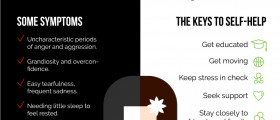
Mental illness is a condition that the disrupts an individual’s thinking, feeling, moods and other every day things. This type of ailment may attack any target at any time.
Symptoms may include mood changes, anxiety, psychotic disorders, eating, personality and developmental disorders as well as many others. Specific phobias count as a common anxiety disorder. Other types include generalized anxiety disorder, social anxiety disorder, panic disorder, agoraphobia, obsessive-compulsive disorder, post-traumatic stress disorder etc.
Schizophrenia and delusions are associated with psychotic disorders. Although the definitions and classification methods depend on a number of circumstances, a few guidelines do exist. The knowledge on the matter has greatly broadened as of late.
Mental illness can occur in any family, regardless of the genetics involved. However, the latter may play a key role in the identification efforts. If a family member has already presented with similar symptoms, the patient might have a better chance in finding and administering adequate treatment.
The purpose of each visit the patient and his family members make to the doctor should be a discussion about the behavior involved and creation of effective strategies for dealing with it. Family support and an early diagnosis significantly better the patient’s chances of having an effective treatment.
Mental illnesses are classified by symptom and the clinical features of the condition. Yet, the more this ailment is explored and the more information about specific ways in which the genes interact with the illness we gain, there are better chances of coming up with an effective classification method.
This one would be linked to the biological cause for the condition instead of being all about the symptoms.
For instance, a number of disorders is recognized through similar symptoms. These, however, present very different characteristics when it comes to the biology involved. The conclusion is that symptoms by themselves can easily lead to multiple conflicting diagnoses, due to a misinterpretation of brain function abnormalities.
Psychotherapy is a well expected treatment method. Skills programs and psychiatric medication are some other options. The environment in which these treatments are administered can be that of a special school, residential placement, hospital, private office or community clinic.
Psychotherapy and psychiatric medication are two major treatment options. Most patients presenting with this illness tend to feel relief once they get involved in an individual treatment plan.
Failing to provide treatment is likely to result in catastrophic consequences. These range from unemployment and substance abuse, to homelessness, incarceration, suicide etc. The costs associated with the results of untreated illnesses of this type exceed 100 billion dollars in America alone.
An early diagnosis and timely treatment are of critical importance. This warrants an access to the treatment methods and support so desperately needed by the patients suffering from this condition. The faster the reaction is, the better the recovery chances.
















Your thoughts on this
Loading...